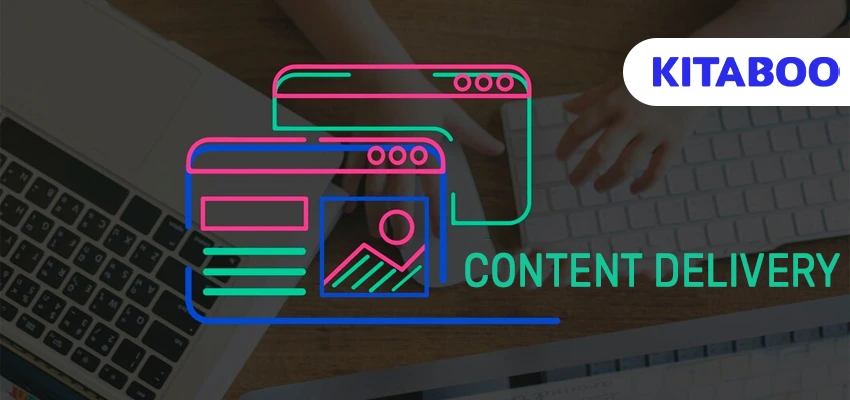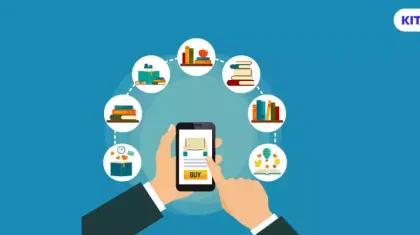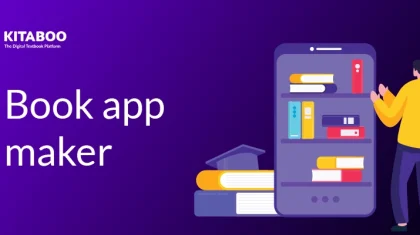
Educational Content Delivery: Preparing for the Future
Summarize this blog with your favorite AI:
Modern learning is no longer confined only to books and classrooms. Instead, education is slowly and steadily flourishing in an era where personalized knowledge is as accessible as your fingertips. Rapid technological advancements have seen the demand for immersive and tailored learning experiences reach new heights, with learners seeking education that suits their unique needs.
A recent survey showed that the global e-learning market is projected to be over $1.5 trillion by 2033, with a CAGR of 17.35%. This momentum is a testament to the fact that people are changing their focus to using more flexible and accessible learning resources.
The future of education is taking shape in this increasingly dynamic landscape. It’s a future where learners no longer remain passive recipients of knowledge. On the contrary, they become active participants where educational content delivery caters to their individual learning styles, interests, and goals.
Read on to learn more!
Table of Contents:
I. The Changing Landscape of Education
II. Why is Educational Content Delivery Changing?
III. The Rise of Digital Content Delivery
IV. Preparing for the Future of Education with KITABOO
- Adaptive Learning
- Educational Insights
- Microlearning
- Augmented Reality (AR)/Virtual Reality (VR)
- Accessibility
V. Wrapping Up
The Changing Landscape of Education
The future of education is indeed changing dramatically. The erstwhile textbook-based learning pattern is slowly wearing off and being replaced by a more vibrant and lively one in which technology allows personalization of the learning process.
As such, the online education industry is going through a period of significant growth and is predicted to reach over a billion users by 2029. Several factors drive this:
- The demand for personalized learning is growing globally. Because students have unique learning styles and paces, a one-size-fits-all teaching approach is no longer practical.
- The large-scale increase in the prevalence of digital natives has made students today more comfortable with technology than any of their previous generations. This has led to expectations surrounding a more digital learning experience.
- Flexible learning is the need of the hour. Constant exposure to technology and the internet has led students to learn increasingly outside the classroom, requiring adaptable and accessible content and interactive learning assessments.
Also Check: Digital Publishing Solution for Content Aggregators
Why is Educational Content Delivery Changing?
The shift in modern learning style is forcing a revolution in the content delivery process within the education sector. Here’s why:
- Evolving Tech: The introduction of online learning platforms and the integration of AI into teaching has changed how subjects are taught.
- Sustainability Efforts: The unending demand for printed material has led to environmental issues, prompting a shift to digital content delivery.
- Content personalization: Content personalization and Content Delivery Networks (CDNs) are helping to tailor educational media to enhance the learning experience. Learners have diverse needs and learning styles, craving flexibility and personalized learning pathways.
- Shifting Job Market: The rise of automation demands a workforce with critical thinking, problem-solving, and collaboration skills. Traditional rote learning can no longer keep pace.
The Rise of Digital Content Delivery
The digital era has brought an impactful change in information access and consumption, and the future of education is no exception.
As digital content takes center stage, traditional teaching methods that have existed for ages have to take the back seat.
What propels this? Factors like widespread internet connectivity and the upsurge of personal mobile devices are some of the reasons.
With the trajectory in education reflecting the changes in the larger digital world, the stage is set for a future where digital content will play an ever-increasing role in shaping how knowledge is shared and consumed.
KITABOO , a digital textbook platform with operations in over 30 countries, exemplifies this significant role of digital content delivery:
- Enhanced Interactivity: It can incorporate multimedia elements like videos, simulations, and quizzes, making learning more engaging and effective.
- Constant Updates: Digital content can be effortlessly updated to mirror the latest changes in study materials and curriculum.
- Accessibility: Digital textbooks can be accessed from anywhere, on any device, making learning more flexible and convenient.
- Detailed Analytics: Educators can gain valuable insights into student learning through analytics tools embedded in digital content platforms.
Preparing for the Future of Education with KITABOO
The educational landscape in content delivery is dynamic. With the rapid introduction of new technologies, approaches are emerging to meet learners’ needs better and enhance education’s effectiveness. That being said, several key trends have emerged that hold significant sway over the future of educational content delivery.
KITABOO , a cutting-edge digital textbook platform, is at the forefront of providing solutions to these emerging trends. KITABOO’s platform equips educators and learners with a range of features that empower them to thrive in the future of education.
1. Adaptive Learning
Powered by advanced algorithms and AI, adaptive learning customizes the educational experience in a digital medium to cater to each student’s unique skills and learning pace. This tailored approach provides just the right amount of challenge, keeping students motivated and engaged.
By integrating this technology into their platform, KITABOO allows students to learn at their own pace and educators to tailor their teaching and assessment methods accordingly.
2. Educational Insights
KITABOO provides educators with tools to create, manage, and distribute digital educational content. They can also track student progress and gain valuable insights into learning outcomes.
3. Microlearning
Microlearning is a method of delivering educational course material using micro chunks of content. It is ideal for modern learners with shorter attention spans and can reinforce key concepts or introduce new information.
KITABOO offers teachers tools and features to create quick modules that are ideal for microlearning.
4. Augmented Reality (AR)/Virtual Reality (VR)
Augmented Reality (AR) and Virtual Reality (VR) have slowly begun to transform traditional content delivery into immersive and interactive experiences. By supporting learning in diverse environments and breaking down geographical barriers, AR and VR allow students to engage in-depth with complex concepts in ways that were not possible before.
KITABOO is already ahead of the curve by exploring the future of immersive technologies. It has integrated specific AR and VR solutions to create innovative and effective student learning experiences.
5. Accessibility
Through its platform, KITABOO empowers learners to access content from anywhere, on any device, and take advantage of features like note-taking, highlighting, and annotation. The platform also has provisions to make learning more comfortable for students with various disabilities.
Wrapping Up
Futuristic digital learning is no longer an idea but an actual reality taking shape right before our eyes. The emergence of digital content delivery and advanced educational technologies that embrace innovation are helping build a more personalized, engaging experience for effective learning for every student.
A leader in this change, KITABOO provides an all-inclusive platform to prepare teachers, institutions and students to adapt to the future of education. Through its platform, KITABOO presents various offerings, including interactive features, accessibility tools, and AI-powered analytics capabilities.
Connect with us now to learn the ways in which KITABOO helps transform your digital educational content delivery.
Also Check:
Discover how a mobile-first training platform can help your organization.
KITABOO is a cloud-based platform to create, deliver & track mobile-first interactive training content.



